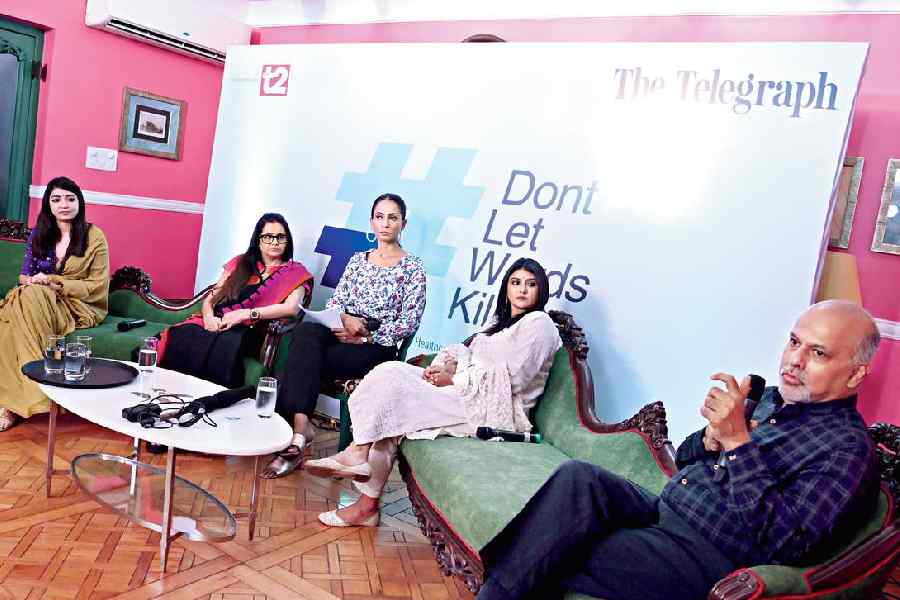Observed on October 10, World Mental Health Day as a concept is committed to the cause of raising awareness about mental health and taking concrete action towards the resolution of mental health issues. To mark this day, The Telegraph hosted a unique initiative #DontLetWordsKill at The Glenburn Penthouse, that put the spotlight on passive aggression, microaggression and insensitivity, some key terms related to mental health. Psychiatrist Dr Jai Ranjan Ram, actress Parno Mittrah, psychotherapist and founder of Caring Minds Minu Budhia, and mental health advocate Charvi Jain made the discussion stimulating and informative apart from giving out solutions to safeguard oneself from the harm caused by toxic behaviour.
Setting the tone for the evening, model and moderator Ushoshi Sengupta shared her experiences that have had subtle negative undertones. “People don’t understand that sometimes these worlds can hurt a lot and we deal with it in our ways. I remember mom saying, ‘When you have a chance and you can leave someone with good words make sure that they are never bad. If you can’t say something good about somebody don’t say bad things also.’” Excerpts from the session...
Ushoshi: My first question would be, what is passive aggression in verbal communication and what causes such behaviour?
Dr Jai Ranjan Ram: Passive-aggressive behaviour refers to a range of behaviours whose main intention is to hurt the feelings of someone or put someone down. One of the most common ways in which people do it is by marginalisation and by ignoring the person they intend to hurt. For instance, a mother-in-law shows passive-aggressive behaviour towards her daughter-in-law by completely ignoring her while she is delegating duties and responsibilities to all other family members for the Diwali rituals to take place in their household. A similar instance can happen in the workplace. If a certain employee does not get along well with the boss, then he or she may be ignored in group discussions by not being given an opportunity to speak up like everyone else.
Stonewalling is another common method of passive aggression, where one person may refuse to listen to or respond when another person wishes to talk about a conflict or a problem. Though it is difficult to pinpoint the source of such behaviour, the main reason why someone behaves passive-aggressively is because they do not respect you as a person. It may be because your ideas and beliefs are in conflict with theirs. This invokes in the person a degree of insecurity as they perceive in you a challenge to their own, probably fossilised, views. Since they cannot contest your views logically, they adopt this method to pull you down. The best response to this kind of behaviour is to ignore it.
Microaggression is a word that is becoming very popular. What is it and how should we respond when faced with it in a social and professional set-up?
Minu Budhia: Though it is gaining popularity now it has existed for long. Most of the time it is unintentional but it can have a long-lasting impact. It is like a mosquito bite, it’s a small bite but it irritates for a long time. Why do we do it? It’s because we have some stereotypes in our minds. How to deal with it? We should always use assertive behaviour and not be aggressive. In the disability area saying things like, 'You look so normal, can you get married?' can affect a person. What you need to do is be assertive and say, ‘I don’t like what you are saying as I get hurt’, and if you don’t want to talk directly then gather your thoughts and write a mail, if you think it’s worth giving time to that person.
How do we understand what behaviour qualifies as microaggression in a workspace?
Budhia: I will explain it to you with the film English Vinglish. At an occasion in the film, while Sridevi is receiving compliments for her talents, the husband says, ‘My wife is born to make laddus’. This is the best example of microaggression. For me, when people ask me, ‘Do you go to the office daily?’ Others will not understand but it is microaggression for me. I go to the office daily and I work hard and what I have been doing and created is all the result of hard work.
Microaggression and passive aggression in relationships like husband-wife and parent-child have always been there. How does this affect the mental health of a family and generations as people carry this kind in their future?
Charvi Jain: First, I would like to distinguish between passive aggression and microaggression. As Dr Ram pointed out, passive aggression is when we are communicating something indirectly like through sarcasm or snide comments or like the silent treatment common in Indian households. Microaggression, on the other hand, is when it is towards a race or community or basically from a dominant community to a minority community. Passive aggression happens in the family because of the cultural nuances that we have. For instance, we emphasise respecting elders and we are not allowed to express it if there’s any disagreement with an elderly relative. So sometimes passive aggression is like a coping mechanism. Also, I think we talk a lot about unity and being together and whenever there is a disagreement, it is looked down upon as disrupting the unity. So, that’s why you resort to silent treatment. Also, it’s very gendered. We as women are conditioned to adjust and compromise.
Does having a balanced mental health and awareness help in choosing a different path?
Charvi: I do believe in the power of choice. Of course, we emulate a lot but the onus is on us. If we think a behaviour has impacted us negatively, we either carry forward it to the next generation or use that awareness to bring that change consciously.
Parno, you are in an industry where you are subjected to the views of your fans and followers all the time, where the line between being funny and being insensitive also gets blurred. How has it impacted you or how do you respond to it?
Parno Mittrah: Now I have developed a thick skin. But growing up, I got used to hearing hurtful and insensitive comments about my dark complexion. “Though dark-skinned, you have a very pretty face”, being the most common among them. People writing horrible comments to a picture of you posted online can impact you very negatively, especially those who are new to the industry. But honestly, I don’t care so much.
If the abusive person is someone known to you, you can have a no-holds-barred conversation with them and get to the bottom of it. But in the case of online bullying, the best thing to do is just move on, as that person is of no consequence to you.
Have you ever got to a point in your life when you have reached out for help?
Parno: There have been other issues for which I have sought professional help, visited a therapist and got medication. I have been a victim of passive aggression in a toxic relationship with an ex-boyfriend. I believe when you have suffered for a prolonged period of time you definitely need help. Sometimes, it’s also important to be aware of what’s happening to you because the person who is inflicting it on you may deny it completely. I strongly believe that their behaviour stems from insecurity, narcissism and lack of confidence and that obviously makes them not want to own up.
Dr J. Ram: I believe the important thing here is knowing how to deal with it and heal yourself, rather than dealing with the other person. So the key is to look after yourself and to know that another person’s words, which are coming from a very dark, negative space, don’t define you. If that person is an online troll or a casual acquaintance who is of no consequence to you, then it is easy to immune yourself from its hurtful impact. But if the abuser is someone close to you, the first response should be to preserve yourself and conserve your energy. The point of passive aggressiveness or microaggression is to make you feel small, so don’t let the person know that he or she has succeeded. You may break into a million pieces, but it is important to never let the other person understand it.
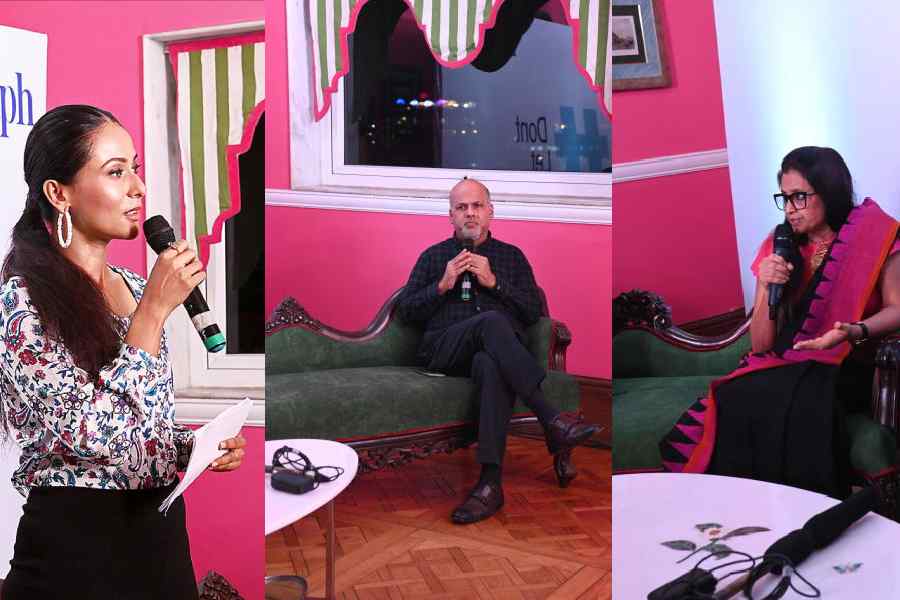
(l-r) Ushoshi Sengupta, Dr J.R. Ram, Minu Budhia
That is really a powerful way to respond to abuse. But how would you differentiate between passive aggression and insensitivity?
Dr J. Ram: Insensitivity is a very general term. An insensitive person will be insensitive to widows, LGBTQIA+ persons, disabled children, and all others equally. They are too thick-headed to understand the lived reality of other people’s lives. Insensitivity is nothing but a lack of imagination. If one is insensitive they would have no idea about the persons, ideals or values that others hold dear, because they are incapable of imagination.Microaggression is something far more deliberate and sophisticated. It is directed towards making you feel bad about yourself.
Do you think that people who are sensitive are far more prone to struggle with mental health problems?
Dr J. Ram: Yes, those who are sensitive definitely suffer more, because we live in a very cruel world. And it has nothing to do with how educated or successful you are. I have met fantastic professionals who are terrible husbands, sons or fathers. I have met ordinary professionals who are great partners, friends and sources of strength to others. They are the first ones you would call in a crisis.
People who are caring and sensitive get mauled by others because we think being polite and gentle is a sign of weakness. And I think a culture that celebrates being strong, powerful and robust is partly responsible for this.
So do you think it is the same for empaths?
Dr J. Ram: Absolutely. See empaths also have a rich imagination, which allows them to feel what the other person is going through. And that is why those who practise the liberal arts and are involved in creative pursuits are more sensitive and tend to feel the hurt more than those who are in other professions. So all said and done, you can’t be a very sensitive person and protect yourself.
Do you think being sensitive is a disadvantage?
Charvi: That’s another form of microaggression. The big debate is that people are too insensitive and hence microaggression doesn’t exist. I don’t take sensitivity as something wrong but we need boundaries, always. Even as therapists, we need to draw a line. I remember at the beginning of my career, my empathy level was so high that I would be affected. Is insensitivity a problem, no that’s the way of gaslighting it.
Please list steps on how do I deal with guilt and shame attached to being sensitive.
Charvi: First, understanding that being sensitive is a strength and not a weakness and we can do it by drawing a boundary. Also, the moment you impersonalise it the shame and guilt are less. Second, addressing the behaviour rather than the person is important because often we end up labelling a person. Using an eye statement, being assertive and making the other person understand how you are feeling is important. Despite that, if it continues then it’s wise to avoid them.
Do you think stereotypes lead to these types of insensitive remarks, and what is the right way to deal with this when in an intimate relationship?
Budhia: Creating boundaries in every relationship is important whether at home, between colleagues, friends and family. There should be a healthy boundary.
How would you define it in the relationship between a mother and child?
Budhia: The relationship that I share with my mother is totally different from that I share with my daughter. I respect both and I have my boundaries with both and they also respect it. I am Priyam’s friend but I am not her friend in totality, I am also a parent and I am there to guide her. A parent cannot be 100 per cent friends with their children.
Dr J.R. Ram: I get very flustered with parents who want to be friends with their kids. Look, parents can never be a child’s friends. Parents have wisdom that they need to share with their children. A friend can only share experiences. So you must acknowledge that you are much wiser because you are much older than them. As a wiser person, your role should be to guide them. Your methods may be friendly, but you are not a friend.
A select set of guests attended #DontLetWordsKill session, listened to speakers in rapt attention
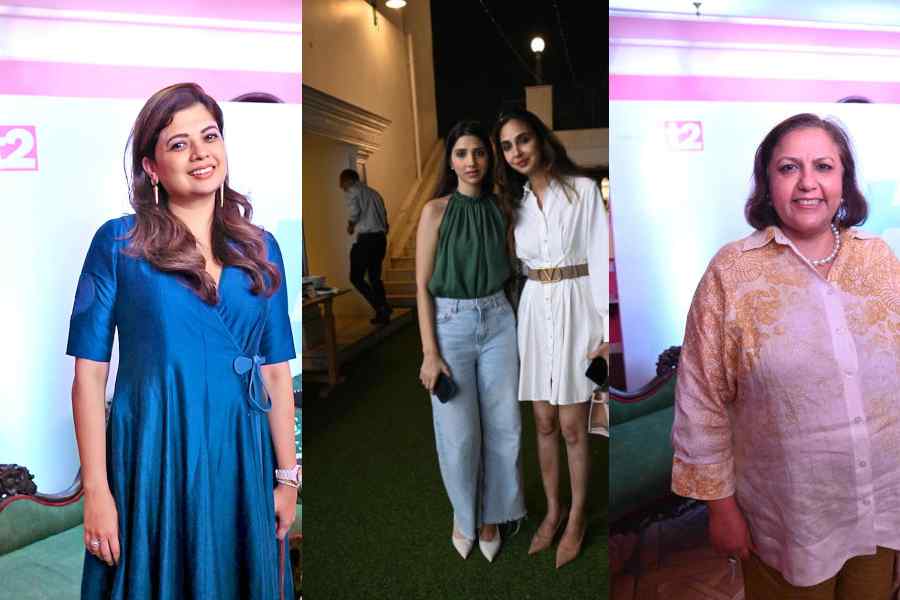
(l-r) Manjri Agarwal, Nupur Arya & Neha Patodia, Lovey Kapur
“Passive aggression was a very relevant topic today. I think we underestimate the importance of what words can mean to someone, good or bad. I think it’s very important that we all learn how to be sensitive about what we say, and be empathetic because we don’t know what goes on in a person’s mind or life. It was a superb session and the panelists were great, they gave a lot of perspectives. I really enjoyed it and thank you t2 for having me,” said entrepreneur Manjri Agarwal.
“It was a great event and this awareness is important as many people face passive aggression without knowing. Being aware of what are you are feeling after facing microaggression is very important. As Dr Ram said that we have to protect ourselves and not let any kind of harsh words get to us because the intention is always to make you feel small and we shouldn’t let that happen,” said nutritionist Nupur Arya (left). “Microaggression happens to us on a daily basis. I myself don’t realise that I was passive-aggressive to someone. This session with a sense of awareness is very helpful because next time I am passive-aggressive to someone or vice-versa, I will know what I feel or the person feels and stop it from happening,” added nutritionist Neha Patodia.
“The topic today was very interesting and an eye-opener about a lot of things. We always think about these kinds of awareness but don’t usually get a platform to talk about it. Today the panellists talking about passive aggression was very satisfying,” said Lovey Kapur, director of Kookie Jar Foods Private Limited.
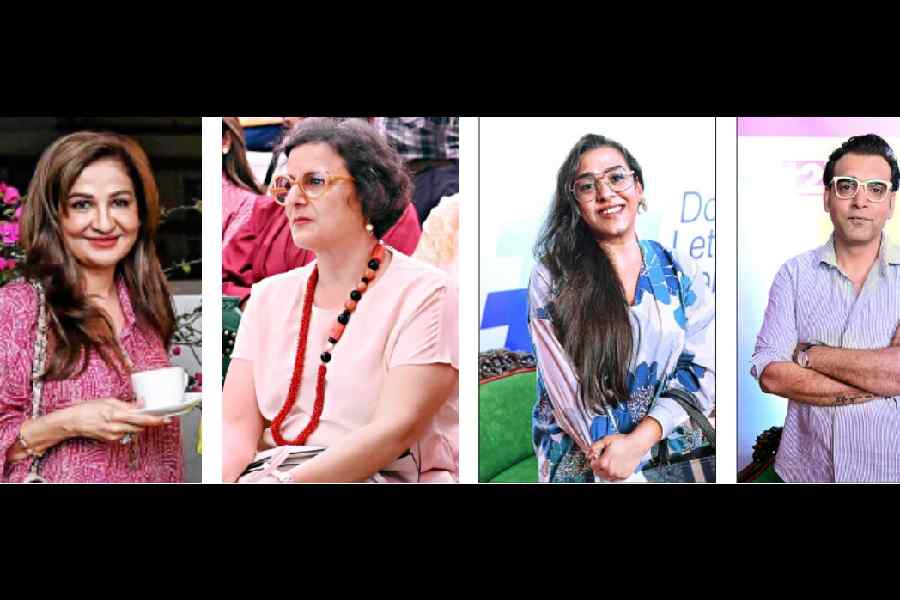
(l-r)Ladies Study Group vice-president Minnie Juneja, Puja Kapur of Kookie Jar, Designer Rimi Nayak, Footwear designer Rohan Arora
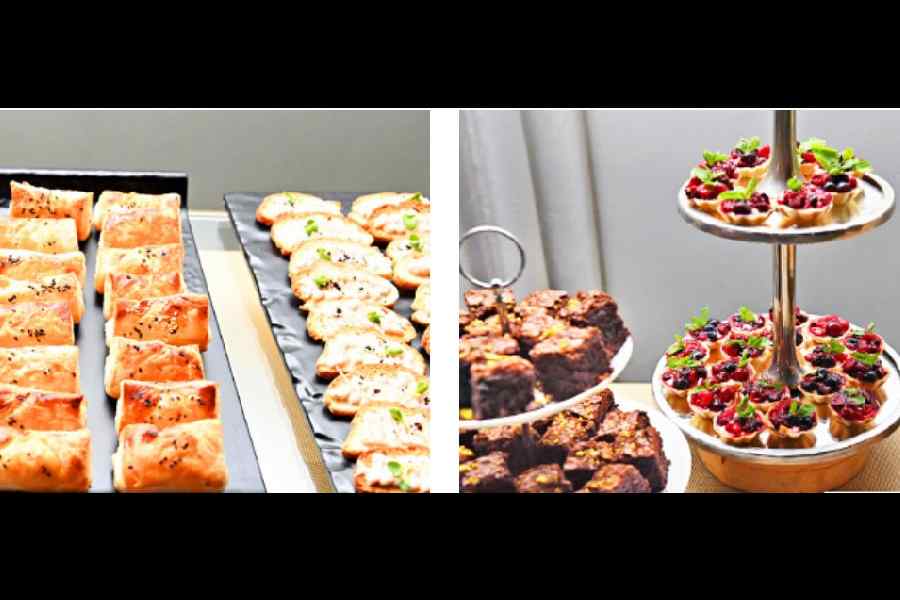
Apart from hot beverages, the menu included a spread of finger food such as Mushroom Vol Au Vent, Brownies, Chicken Puffs, Egg Mint Mayo Sandwich, Tomato Cheddar Sandwich, Caramelised Onions and Goat Cheese Tartlets, Mixed Berry Tarts among others.
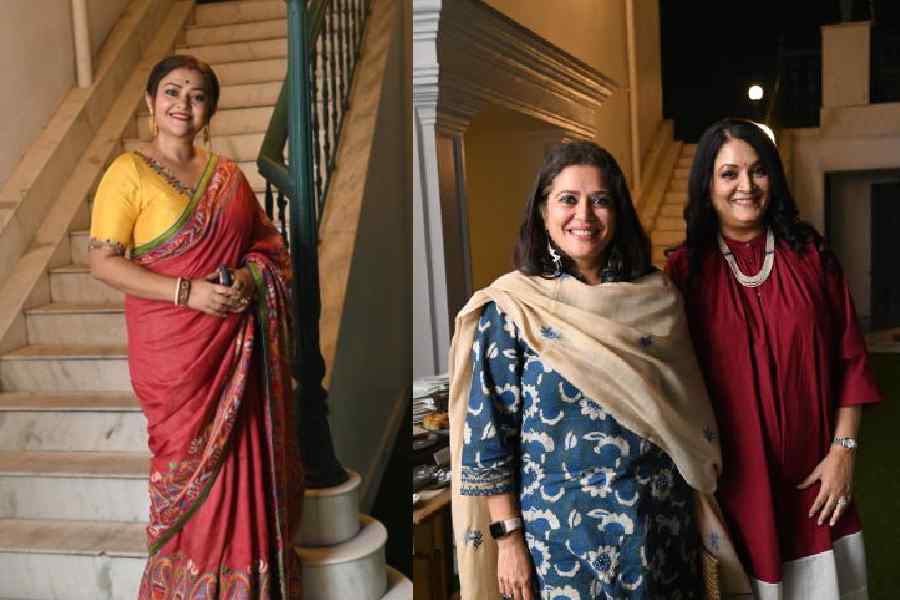
(l-r) Koneenica Banerjee, Abhilasha Sethia & Rupali Basu
“Knowingly, unknowingly we all go through passive or microaggression. It is about how you deal with it. I have come across a lot of people who love to say things just to demean you. They enjoy it. But if you believe in yourself, nurture your inner self and be strong, all you have to do is just forgive them and move on. That will make you feel good,” said the actress Koneenica Banerjee.
“It is a very relevant topic today, especially on World Mental Health Day. I think it’s a fabulous initiative taken by t2 and it was really nice to listen to all the speakers and their thoughts. These kinds of sessions should happen more often,” said Abhilasha Sethia, a food consultant and author (left). Dr Rupali Basu, director and CEO of Woodlands Multispeciality Hospital, said, “I think it’s very important to talk about mental health issues, especially on topics like passive aggression which are generally not talked about much. People are not aware that they face microaggression. I think it was very important to have this conversation today. Everybody was very engaged and I think the audience listened so carefully.”
